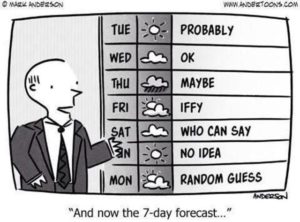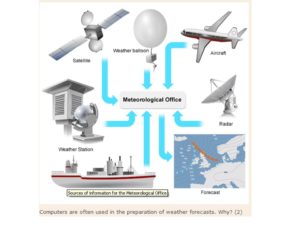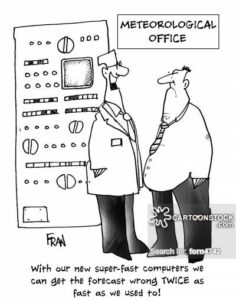It’s going to snow…or rain…or probably be sunny?
The Forecaster said what?
I was at a meteorological convention the other day when I ran into my two favorite forecasters Otto and Herman. Otto is the local newscaster for WOMG-TV and Herman is the local weatherman for TV station WIDK. They were having a heated conversation which I didn’t want to interrupt, but couldn’t help but overhear.
————————-
“I don’t know why they pay you any money for the guesswork you do predicting the
weather,” shouted Otto, “What do you use, a crystal ball? I’d get new batteries if I were you, it’s rarely correct.”
Herman wasn’t too insulted as he was used to Otto’s complaints. “I analyze the weather patterns as I was taught to in school. There is always a degree of error involved in predicting the weather.  Mother Nature is not always consistent.”
Mother Nature is not always consistent.”
Otto retorted, “And what school was that? Elementary school? Come on I can stick my head out of the window, look at the sky and be just as accurate as you. You love showing
those big maps and radar and scientific stuff to justify your claims. It’s a shame that Mother Nature hasn’t read the same manuals.”
“I’ll have you know that it takes a minimum of 4 years for a Bachelor of Science degree to be a meteorologist.” Herman reacted, “Many meteorologists pursue Masters of Science, even doctoral degrees. We don’t just sit back and play with our Magic 8-Balls. We study patterns over time. There are lots of different projections that coalesce as we get closer to an event so our predictions become more reliable.”
 Otto scowled, “Then why don’t you wait until they are reliable before you give out your predictions? Other than to panic people about a rainy day, what purpose is there in giving a 10-day forecast, if you don’t really know what is going to happen until the day before?”
Otto scowled, “Then why don’t you wait until they are reliable before you give out your predictions? Other than to panic people about a rainy day, what purpose is there in giving a 10-day forecast, if you don’t really know what is going to happen until the day before?”
“Meteorology is a science and should be treated as one. People need to know that we don’t just pick predictions out of the air. They need to understand the process to better understand the prediction. When you learned math in school were you just given the answers or were you taught what the process was to discover the correct answer yourself? Knowing the process builds a better understanding.”
Otto waved that one off. “Don’t get me started on math, that’s for another discussion. If your process is so good, then why are there so many different models and predictions? Shouldn’t everyone seeing the same data come up with the same results.?”
Herman hesitated for a moment on that one. “That would seem to be correct, but depending on what you use as relevant data and what tools and historical events you use to make your prediction, you might get different answers.”
“Then why don’t you all get together and agree on standards of data and history to use or work on developing new technology that is more accurate?” Otto continued to push.

Herman was quick with that answer. “What makes you think we are not advancing our field of expertise. Our weather predictions have become much more reliable as we develop new techniques for both gathering information and analyzing our past.”
Otto snarked, “Probably doesn’t hurt your ratings either?”
At this point, they both became too frustrated with the whole conversation and the topic was dropped, as most of their discourses usually are.
——————————–
As for me I basically wait to see what the day is like. When I wake up, I deal with whatever Mother Nature has planned for me. Let all those others watch their daily weather updates and forever change their plans for each right or wrong prediction.
C’est la vie!




Pingback: A to Z Challenge Blog 2018 – Reflection | hdhstory.net